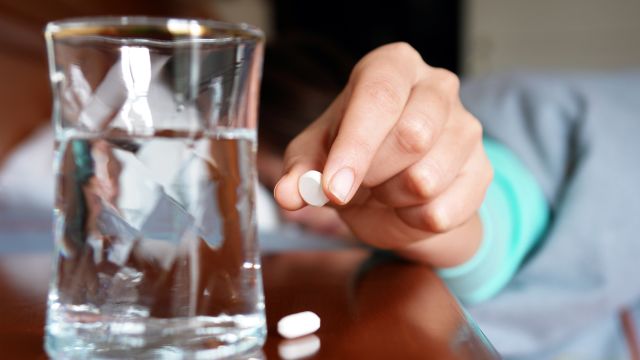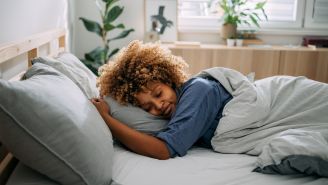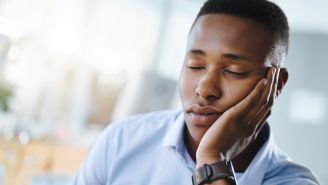Updated on September 20, 2024.
If you consistently have trouble falling asleep, you may have heard about melatonin. It’s an increasingly popular supplement for sleep, with its use becoming five times more common among adults in the United States between 1999 and 2018.
But does melatonin reliably and effectively help you sleep? If so, how much should you take and when should you take it? And what is melatonin, exactly?
What is melatonin?
Melatonin is a natural hormone produced in the pineal gland, a tiny organ deep inside the brain. This gland’s main task is to help with managing your daily sleep and wakefulness cycle. Your pineal gland gets messages from the retinas in your eyes about light levels. During the day, the gland secretes low levels of melatonin. When darkness falls, it begins secreting high levels of melatonin.
Melatonin’s importance is still not completely understood by researchers. But they believe it causes different parts of your body to synchronize their circadian rhythms, also known as your 24-hour body clock. Circadian rhythms are most responsive to changes in lightness and darkness.
Once the night is over and your body is exposed to daylight, melatonin levels drop, your body temperature rises, and cortisol (a stimulating hormone) is secreted. Given that melatonin production begins when your surroundings begin to darken, it’s not surprising that bright and artificial lighting prevent its release, interfering with your sleep.
While melatonin is a hormone your body naturally produces, synthetic melatonin is one of the few hormones you can buy without a prescription. Store-bought melatonin doesn't work like sleeping pills, however, and it will not put you to sleep.
What melatonin may do is help shift your biological sleep clock a bit earlier and make it easier to fall asleep.
Who should take melatonin?
When taken correctly and at the right dosages and times, melatonin supplements can be helpful for:
- Shift workers who are exposed to light at night
- People with sleep disorders
- People with insomnia
- People experiencing jet lag
Melatonin may also help soothe anxiety before or after surgery.
That said, melatonin—or any sleep medication—should not be used as a front-line treatment to help with sleep.
“We try to get people to sleep better without medication treatment, and at least two-thirds of the time, we’re able to do that,” says Keith Roach, MD, associate professor of clinical medicine in the division of general medicine at Weill Cornell Medical College and New York Presbyterian Hospital.
Before experimenting with supplements, make an appointment with your healthcare provider (HCP) to talk about your sleep concerns. Your HCP will seek to find out whether you may have an underlying health condition that could be affecting your sleep, such as restless legs syndrome, obstructive sleep apnea, or narcolepsy. They will also likely screen you for other medical causes that may be contributing to your difficulties. Early morning waking, for example, could be a sign of depression, Dr. Roach notes.
If it seems that your everyday habits may be the main reason behind your sleep problems, your HCP may recommend taking steps to set up a better sleep routine. Things to try include the following:
- Power down electronic devices and other sources of light at least two hours before bedtime. If you do use devices in the evening, try using blue-light blocking glasses or screen shields to cut down on stimulating blue light.
- Get out of bed if you’re unable to sleep. “You don’t want your bed associated in your mind as a place where you just lie there and get frustrated,” says Roach. If you can’t fall asleep within 20 minutes, go to another room and listen to quiet music, read a book using a dim light, or practice some breathing techniques. Return to bed when you feel sleepy.
- Stick to a consistent sleep and wake schedule, even on the weekends.
- Set your bedroom temperature at a cool range between 60 and 70 degrees.
- Avoid daytime naps and only use your bed for sleeping.
- Steer clear of alcohol, cigarettes, and heavy meals beginning at least two hours before bedtime, and avoid caffeine at least six hours before going to sleep.
- Don’t exercise too close to bedtime. It’s best to work out four or more hours beforehand.
- Do evening activities that help you relax, like taking a hot bath or having a cup of chamomile tea.
- If noise interferes with your sleep, consider using a white noise machine or ear plugs.
What to keep in mind if you do take melatonin
If you’re practicing healthy sleep habits but you’re still having trouble getting quality rest, your HCP may suggest that you try melatonin.
“Melatonin is relatively safe,” says Roach. “It may be worth a try for some people.”
But there are some things you should consider about melatonin before you try it:
The timing and dosage of melatonin matters
If melatonin is going to help you, you need to take the right dosage at the right time. If you take too much at the wrong time, you could be sleepy during the day and wide awake at night.
It’s important to remember, also, that dietary supplements aren’t tested or regulated by the U.S. Food and Drug Administration (FDA), and many products may provide inaccurate labeling information on their packages.
The actual melatonin content of some melatonin products, for example, can range widely from what’s listed on the label. The melatonin content of the same brand may also vary from bottle to bottle. And some bottles may even contain serotonin, a different hormone that can cause problems even at low doses.
Talk to your HCP about the timing and dosage that’s right for you, and check labels carefully before buying so you can at least have an estimate of how much you’re getting.
Melatonin's effectiveness depends on your symptoms
Melatonin is more likely to work for people who wake up very early in the morning (which could indicate a circadian rhythm problem) or for those who aren’t able to fall asleep right away, says Roach. “For those who wake up after an hour or two of sleep, it’s probably not effective,” he adds.
Melatonin is only a short-term fix
Your HCP is probably going to recommend melatonin for short-term use only. There is not enough information yet about the safety of taking it over the long term. If you’ve been taking melatonin for three months and not sleeping better, Roach says it’s probably not working so you should stop and talk to your HCP. In that case, you may have a more serious underlying sleep condition that would require different treatment.
Some people shouldn’t take melatonin
Although melatonin is generally seen as safer than other sleep medications, including over-the-counter options like diphenhydramine (Benadryl), Roach says there are some circumstances when your HCP may not recommend it. These may include:
- You’ve had an adverse reaction to melatonin in the past
- You’re taking other prescription sleep medication
- You’re pregnant or breastfeeding
- You have health conditions, including autoimmune disorders, diabetes, depression, dementia, or high blood pressure
Certain medications may be negatively affected by melatonin. These include, but are not limited to:
- Anticonvulsants, which treat seizures and may be used to treat other health conditions like migraines, nerve pain, and some mental health conditions
- Anticoagulants, also known as blood thinners
- Blood pressure drugs
- Diabetes drugs
- Medicines that suppress the immune system
Be sure to consult with your HCP first if you’re taking other medications.
Older people may experience daytime fatigue with melatonin supplements and children may experience mild side effects like drowsiness or more frequent bedwetting. There isn’t as much information yet on children and melatonin, so it’s not known how taking melatonin may affect child development.
The bottom line on melatonin
Research so far suggests no major safety concerns about melatonin, but more studies are needed to fully understand its effectiveness and safety. It’s important to recognize that just because a supplement is “natural” does not always mean it’s safe for all people. It’s always best to see your HCP before you start taking any new supplement, especially if you’re doing all you can to practice healthy sleep habits and are still having difficulty sleeping.
Your HCP can screen you for underlying conditions that may be interfering with sleep. And if you do decide to try melatonin, your HCP can advise you on the dosage that may work best for you.







